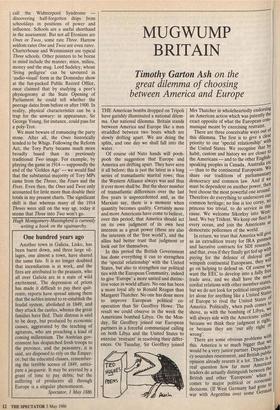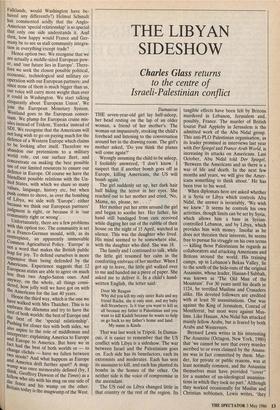MUGWUMP BRITAIN
Timothy Garton Ash on the
great dilemma of choosing between America and Europe
THE American bombs dropped on Tripoli have garishly illuminated a national dilem- ma. Our national dilemma. Britain stands between America and Europe like a man straddled between two boats which are slowly drifting apart. We are doing the splits, and one day we shall fall into the water.
Of course old Nato hands will pooh- pooh the suggestion that Europe and America are drifting apart. They have seen it all before; this is just the latest in a long series of transatlantic marital rows; thus the Western Alliance always was and thus it ever more shall be. But the sheer number of transatlantic differences over the last five years is unprecedented and, as the Marxists say, there is a moment when quantity becomes quality. Certainly more and more Americans have come to believe, over this period, that America should act on its own judgment of its own best interests as a great power (these are also the interests of the 'free world'), and the allies had better trust that judgment or look out for themselves.
In this period the British Government has done everything it can to strengthen the 'special relationship' with the United States, but also to strengthen our political ties with the European Community, indeed to give 'Europe' a more united and distinc- tive voice in world affairs. No one has been a more loyal ally to Ronald Reagan than Margaret Thatcher. No one has done more to improve European political co- operation than Sir Geoffrey Howe. The result we could observe in the week the Americans bombed Libya. On the Mon- day, Sir Geoffrey joined our European partners in a forceful communique calling on both Libya and the United States to exercise 'restraint' in resolving their differ- ences. On Tuesday, Sir Geoffrey joined Mrs Thatcher in wholeheartedly endorsing an American action which was patently the exact opposite of what the European com- munique meant by exercising restraint. There are three conceivable ways out of this dilemma. The first is to give a clear priority to our 'special relationship' with the United States. We recognise that by habit, custom and history we are closer to the Americans — and to the other English- speaking peoples in Canada, Australia etc — than to the continental Europeans. We share our traditions of parliamentarY democracy and common law. And if we must be dependent on another power, then best choose the most powerful one around. Therefore do everything to underscore our common heritage; no line is too corny, 11° princess too trivial, to do service in this cause. We welcome Sikorksy into West- land. We buy Trident. We keep our fleet in every ocean, and join the Americans as democratic policemen of the world. In return, we trust that America will give us an extradition treaty for IRA gunmen and lucrative contracts for SDI research, and that, even if they finally get fed up with. paying for the defence of disloyal anel wimpish continental Europeans, they Will go on helping to defend us. Of course We want the EEC to develop into a fully free trade area, and we shall have the most cordial relations with other member-states, but we do not look for political integration, let alone for anything like a United States, of Europe to rival the United States 01 America. Politically, when push comes to shove, as with the bombing of Libya, we will always side with the Americans: either because we think their judgment is right, wrong'. There because they are 'our ally right I. ° There are some obvious problems with this. America is so much bigger that we would be a very junior partner. Depender?- cy nourishes resentment, and British blic opinion already resents it a lot. There is a real question how far most American leaders do actually distinguish between the British and other 'Europeans' when it comes to major political or economic decisions. (If West Germany had gone tu_ war with Argentina over some German Falklands, would Washington have be- haved any differently?) Helmut Schmidt has commented acidly that the Anglo- American 'special relationship' is so special that only one side understands it. And then, how happy would France and Ger- many be to see us stall community integra- tion in everything except trade? Hence option two. We recognise that we are actually a middle-sized European pow- er, and 'our future lies in Europe'. There- fore we seek the closest possible political, economic, technological and military co- operation with our European partners: and since none of them is much bigger than us, our voice will carry more weight than ever it could in Washington. We start talking eloquently about 'European Union'. We join the European Monetary System. Westland goes to the European consor- tium. We plump for European cruise mis- siles instead of Trident, 'Eureka' instead of SDI. We recognise that the Americans will not long wish to go on paying much for the defence of a Western Europe which claims to be looking after itself. Therefore we abandon our pretensions to a military world role, cut our surface fleet, and concentrate on making the best possible use of our limited resources to ensure our defence in Europe. Of course we have the .friendliest possible relations with the Un- ited States, with which we share so many values, language, history etc, but when Push comes to shove, as over the bombing of Libya, we side with 'Europe': either because we think our European partners' judgment is right, or because it is 'our community right or wrong'. Unfortunately, there are a few problems With this option too. The community is set in a Franco-German mould, with, as its centrepiece, an apparently immovable Common Agricultural Policy. 'Europe' is not a word that makes the British public leap for joy. To defend ourselves is more expensive than being defended by the Americans. Experience suggests that 12 European states are able to agree on much less than two Anglo-Saxon ones. And anyway, on the whole, all things consi- dered, how jolly well we have got on with the Americans for the last 40 years. Hence the third way, which is the one we have walked with Mrs Thatcher. This is to embrace the dilemma and try to have the best of both worlds: the best of Europe and the best of the 'special relationship'. rushing for closer ties with both sides, we also aspire to the role of middleman and interpreter: explaining America to Europe and Europe to America. But have we in fact had the best of both worlds or — to Change clichés — have we fallen between two stools? And what happens as Europe and America drift further apart? A mug- nip was once memorably defined (by, I think, Geoffrey Dawson of the Times) as a fellow who sits with his mug on one side of the fence and his wump on the other. Britain today is the mugwump of the West.



















































 Previous page
Previous page